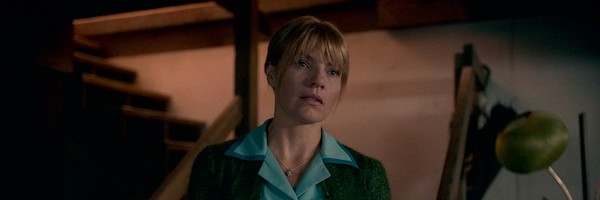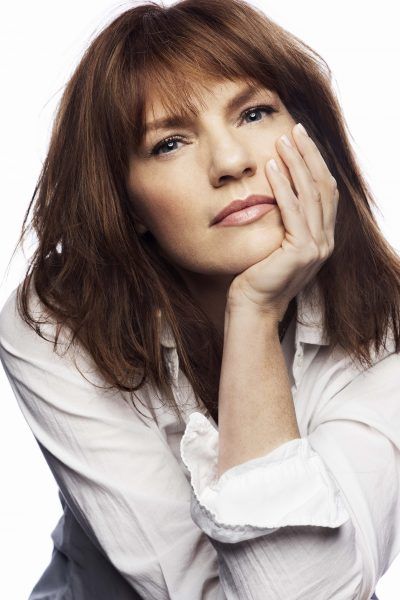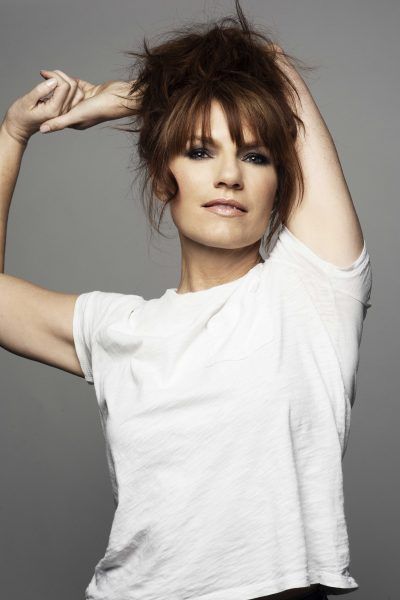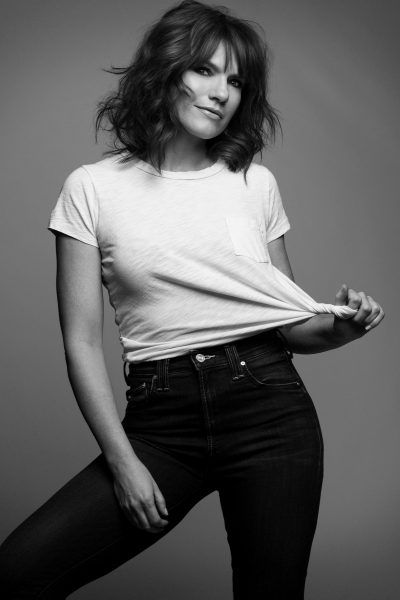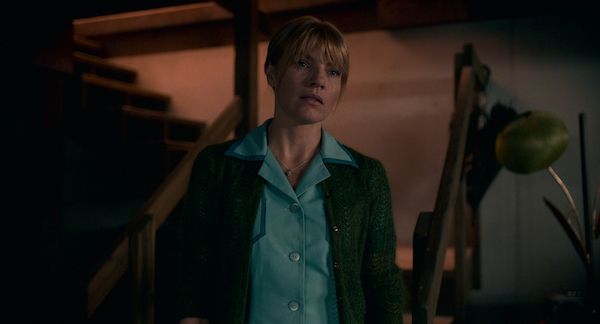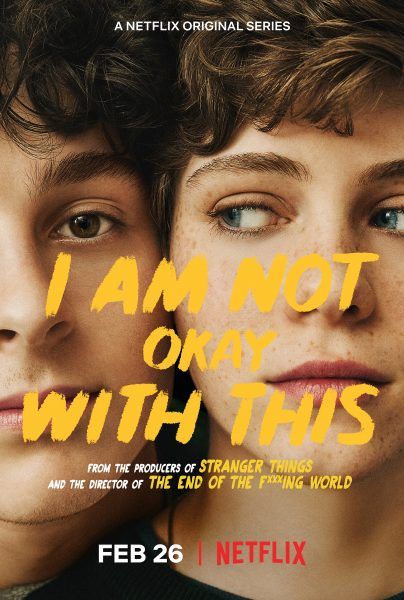I Am Not Okay with This may focus on on Sophia Lillis' super-powered Sydney and her friends, but the Netflix series is also about a family drama at its core. Sydney deals with the loss of her father and the awkwardness of adolescence. Like most if not all teenagers, she also clashes with her mother, Maggie Novak, played by veteran actor Kathleen Rose Perkins.
During a visit to the set of the Netflix show in Pittsburgh, we had a chance to chat with Rose Perkins about her role as Sydney's mother and her part to play in the super-powered sub-plot. (We also spoke with showrunner Jonathan Entwistle and stars Lillis, Wyatt Oleff, and Sofia Bryant; be sure to check them out for much more on #IANOWT!) Our talk with Rose Perkins follows below:
What's it like working with Sophia in that it's a maternal role, but a fraught one? How are you guys together? How do you see Maggie and Sydney's relationship blossom over the season?
Kathleen Rose Perkins: Yeah, she's awesome. She is, I feel like she's an introvert and I think this business takes both kinds, introverts and extroverts. And I'm an introvert who's kind of learned how to be slightly extroverted, so I understand her and I really appreciate that she's not going to just be your best friend right off the bat. There's no assumed intimacy with her. It takes a moment to kind of get to know her. We were just sitting waiting to shoot something and I asked her what her favorite food was and she was like, I don't really, I don't think I have a favorite food.
And I said, "Okay, well what's your least favorite food?" And she's like, "I don't know. I like pretty much everything." And then I started going down the list of like really crappy food that I could think of, like peas and asparagus, and broccoli, lots of vegetables, eggplant. And she was like, "No, I like that. Yeah, no, I love asparagus." And then I got to like really weird food and asked her about like sea urchin at one point and she was like, "Oh yeah, no, I've had that, it was good, it's good." So she's like totally open and she doesn't have a favorite anything and she's just this really kind of like sweet, awesome girl who is quiet and keeps to herself. Incredibly smart. I would want to be on her team in the apocalypse because she's easygoing. She'll eat whatever you can find and I could boss her around, probably, so I could tell her what to do and she'd go do it. She'd just kind of like, "All right, yeah." She's awesome.
Do you see her kind of switch from Sophia to Sydney, then?
Kathleen Rose Perkins: I think I do. I mean, I don't want to presume that I know her that well, but I think that she has a lot of similarities to Sydney but yeah, she is quite different. She doesn't really switch. She more just... I'm very different from Maggie as well, and so I feel like once we get on set and just kind of start working together, we both kind of fall into the characters or we've been attempting to. But everything I've seen her, she's just got a really awesome photographic face. Like, it's very emotive without doing very much so. And she's not loud and I don't think Sydney is loud, which I think is fascinating because the thing that's happening to her, this is an origin story of a young, ordinary wallflower girl discovering that she's got super-powers, is just alarming to happen to someone like her.
And that I think is great. I'd much rather watch that than the beautiful, outgoing... person [who] gets the super-powers as well; this is kind of great that it's in the hands of somebody who really doesn't want them and would prefer to just kind of go on about our business being invisible in a way. So what is she going to do? You want to watch what this girl is going to do, and that's great storytelling, when you give something that the main character just really doesn't want to deal with, it's great.
You mentioned that you and Maggie are very different, so how are you different?
Kathleen Rose Perkins: I don't have kids. I have no idea what it's like, I'm like the cool aunt and I'm the one who indulges and, I don't care what they do, it's just let's do it together because I want to have fun too. So let's party. Whatever. Yeah. I don't know what that's like to be a parent and the discipliner and the person who creates a human, I don't know what that's like. So, that's different.
I also, I've never waited tables before, and I'm a much higher energy level than she is. She's very salt-of-the-earth and down-to-Earth and kind of "I've got a task and I've got to get it done." She does have a bit of a wry sense of humor, which I really appreciate and that's the one thing that I was trying to kind of pull out wherever I could find it.
But I don't have very much in common with her. I understand what it's like to grieve and to lose someone very important to you, so that is the thing that I tried to hook into as much as I could. And she's a workaholic. She works hard for her money. She's barely making ends meet but she is making them meet, which is impressive for a woman in this day and age to do that, I think. She's a good worker and she is distracting herself or deflecting and just refusing to grieve the loss of her husband.
How has the grief changed Maggie's relationship with Sydney and how do you see it changing throughout the season?
Kathleen Rose Perkins: It's a really awful thing to lose somebody, especially somebody who's really dear to you, and part of your family, and then not to be able to talk to your family, your other family members, about that you're basically isolated from each other because the idea of speaking his name or... It's exhausting. Plus also she's a teenager, a woman of a certain age kind of dealing with the hormones that come with that so, that alone is enough to drive us at each other. But then we are in completely... we're together, but we're in our own universes, in our own bubbles, and we can't speak to each other. We can't talk about the AC going out. We get into a fight about that. It's awful.
And I think the writers have been really smart about being very attentive and respectful of the arc throughout the course of eight episodes and to try and make that as real as possible. Not heavy handed, or over-dramatized, or unbelievable, because there's so much familiarity there. We've been living together forever. I know her in and out and I know who she is, but she's also this completely different... teenage girls just become different animals altogether. They go from little girls to these beasts, so deal with that, but on top of it, we lost my husband and her father; they were best friends and it's just bad. It's not good when you meet them. I think they did a great job developing that relationship arc all the way through the first season. I say first season as if there's going to be a second, third or fourth. Yeah.
Is your character aware that there's anything mysterious or something you don't understand going on with Sydney? Or does she just chalk it up to teenager hormones and grief from the passing of her father?
Kathleen Rose Perkins: Oh, that's a good question. But I don't think I should say. I feel like that's the thing that you've got to... like it's so great to see how these people deal with them, whether or not they have knowledge of super-powers or if it's just her. And that's the fun part of their relationship I think that you kind of want to watch.
Is their relationship more combative or is there more of a silent tension in your scenes? Did you guys play with the different tones of that?
Kathleen Rose Perkins: Yeah, we played with that. You don't want to see people fighting all the time, and I think what the writers did were very smart, not having them just at each other all the time. And it's what they live with day in, day out. So, so if they fought like cats and dogs all the time, it would be really exhausting for the audience member to watch.
So yeah, there's lots of levels. I think that happened with Sydney's relationships with every single person. It's really, it's her story, she's the hub of the wheel and we're all spokes and we're telling this story that she's going through, this coming of age that she's going through, and every one of the relationships that she has, has lovely levels, believable, but lovely levels. And the same thing with Maggie and Sydney.
What was it like working with Jonathan and in developing the character, too?
Kathleen Rose Perkins: He's great. So I'm really comfortable with English people because I worked on a show that was shot in England and so he's very English. He's very British. He's very laid back and kind, but not overly effusive. He's very not LA and I think his DP Justin Brown, they've created this amazing world in The End Of The F*cking World and that beautiful color palette and way of shooting, and they are editing on set there.
I can see the collaboration that's happening in the middle of setting up scenes and in the middle of actual shooting scenes. They remember where these characters are going to and where they're coming from and they just want to make sure that visually it makes complete sense and is entertaining to the eyes without being distracting, which I think The End Of The F*cking World was really good at because it just, the cinematography added so much to the story and I think that's what they're doing here, too. So, and really like, great to collaborate with because he didn't make me cry with his notes. He wasn't condescending, he was just really easy and I, I enjoyed it a lot. I'm very comfortable with British people.
Were you a fan of The End of the F*cking World before you booked this one?
Kathleen Rose Perkins: Oh yeah. So, yeah, that's... the thing is I read the script, I found out the creative minds behind it, but the producers of the show Stranger Things which, I love that show, and then Jonathan and Justin, and Charles Forsman, who was the graphic novelist for both The End Of The F*cking World and this, that's the creative team behind this, and then it's Netflix on top of all of that. It's a perfect trifecta, that checks all the boxes for an actor. So I was like, "Can I please be part of it?" I really, really wanted to be a part of it, just because the creative people behind it are awesome.
Did you get a chance to have other scenes with the rest of the cast members outside of Sophia?
Kathleen Rose Perkins: Well, I had, yeah, I worked with Aiden [,Wojtak-Hissong] because he's my son and I have one scene with Dina, but everybody else I'm... I'm really just focused on her. I don't know if I'm supposed to say that. I might have ruined something, but yeah, yeah.
I think we're okay.
Kathleen Rose Perkins: It's an ensemble. Yeah.
Your character's in working-class Pittsburgh, a waitress, a single mother. It's a very, almost hyperspecific kind of persona. What kind of research did you do? How did you decide to build this character?
Kathleen Rose Perkins: That's a good question. I'm from Michigan, I'm from the Midwest and I do know that... I don't think I'm spoiling anything when I say that they did move around a lot. So they're not specifically from Pittsburgh, I don't think. So yeah, I basically just relied on my own Michigander accent and I know what it's like to kind of work... I've never been a waitress, but I've done retail, so I know the customer service, I understand that.
It's really kind of amazing to be in Pittsburgh because it permeates the environment. You feel that salt-of-the-earth, not blue-collar worker, but worker just in every aspect, you feel like it's a working class environment. When it comes out, let me know if it fits.
Does the set help you focus in on what your character is?
Kathleen Rose Perkins: Oh my gosh, yes. And the colors and the coffee mugs are so amazing cause they're the cream ones with the brown circle around the top and just everything is, that's what I love about this look is, it's very nostalgic. All the colors are very autumnal, and brown is pervasive. It's set in Brownsville, Pennsylvania. I mean it's John Hughes-esque. It's got that 80s vibe that I really, really, really appreciate. And yeah, going into that house with the, all those tchotchkes they have little hedgehog... There was like a puppet, like, "When did that happen? When did I ever work puppets? That must have been my husband's." Yeah. So just like going through and seeing how we live is always such a big indicator of who these people are.
And I just, honestly, shoes are very important to me for characters. If I'm in a high heel, that just... And Maggie always wore those hospital loafers because she works in a diner. So it informs a lot. It's all about the desperate need for comfort and. "I'm not here to look pretty, I'm here to work", which I think is very interesting for women. I had very little makeup on. My hair was pulled back most of the time, I was a worker bee, and that's, that's very informative. So, yeah. You get kind of like, it's discovery while you're trying to look like you know what you're doing and trying to desperately quickly figure out familiarity.
Like, this is my cupboard. This is my coffee cup, this is my coffee machine. I don't know how to pull it out and it's spilling all over but you got to get the tape pretty quickly. So I like it cause it's a challenge and it keeps you on your toes and yeah, you just kind of grasp at all sorts of things when you're trying to figure out a character.

